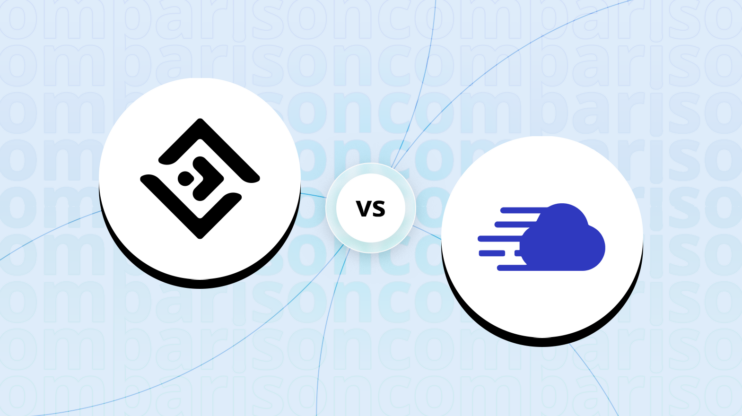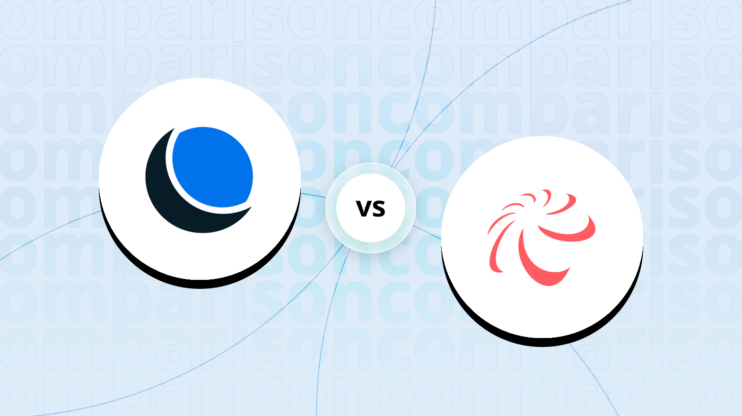Cloudways vs Pagely: Final verdict
Comparing Cloudways and Pagely, Cloudways offers a more budget-friendly and versatile solution while Pagely focuses on premium, enterprise-level hosting.
-
Cloudways (Overall grade: 8.5)
excels in providing an economical managed cloud hosting solution with impressive performance and solid reliability, boasting uptime metrics of 100% in 2020 and 2021, and 99.99% in 2022. Its standout features include a user-friendly control panel, vertical scaling, and built-in performance optimizations like advanced caching and SSD hosting. The platform integrates seamlessly with services like Cloudflare Enterprise for CDN and offers simple, 1-click actions for various tasks. Despite the lack of dedicated and VPS hosting options, Cloudways is praised for its accessibility, strong customer support, and extensive security measures, making it a great option for SMEs and individuals looking for cost-effective yet robust hosting.
Pagely (Overall grade: 8.1)
is tailored for high-end users seeking superior performance, uptime, and advanced security. Using AWS infrastructure, Pagely provides a high-availability architecture with separate availability zones and multi-region redundancy, ensuring quick recovery and maximum uptime. Performance is also top-notch, with an average response time of 211ms, though this comes at a higher cost with plans starting at $199/month. Pagely’s support is highly rated, offering detailed account management, automated malware scanning, and comprehensive compliance with industry standards. While pricing and complexity may deter smaller businesses, Pagely’s advanced features and dedicated support make it ideal for agencies, enterprises, and high-traffic websites.
 Overall grade:8.5 |
 Overall grade:8.1 |
|
|---|---|---|
| Uptime and Availability | 9.5 | 9.5 |
| Hosting Performance | 8.8 | 8.8 |
| Hosting Security | 8.0 | 9.2 |
| Price | 8.6 | 7.4 |
| Hosting Features | 6.9 | 4.6 |
| Ease Of Setup | 9.0 | 8.2 |
| User Management | 8.2 | 8.4 |
| Customer Support | 9.2 | 8.9 |
| User feedback | 4.7/5 | 4.9/5 |
Hosting types offered
Both platforms provide a variety of hosting types, each designed to meet the different needs of users.
 |
 |
|
|---|---|---|
| Shared hosting | ||
| Cloud hosting | ||
| WordPress hosting | ||
| Ecommerce hosting | ||
| VPS hosting | ||
| Dedicated hosting |
Although both offer a variety of hosting plans tailored to different needs, in certain cases, one platform may prove to be more suitable.
Detailed comparison
Uptime and availability
Evaluates the average uptime statistics, uptime guarantee and overall availability of the hosting
provider
Score Components:
- Uptime percentage (30%): evaluates the uptime statistics in given period of time
- Uptime guarantee (20%): Assesses if the platform offers an uptime guarantee and
whether the actual uptime matches the promised guarantee. - General performance (25%): Evaluates how fast is the average response time and overall
it’s stability. - Responsiveness (10%): Adaptability to different devices and screen sizes.
- Availability (25%): Reflects the total downtime and number of outages.
 9.5
9.5
 9.5
9.5
Winner Cloudways: Exceptional managed cloud hosting with high uptime reliability and performance.
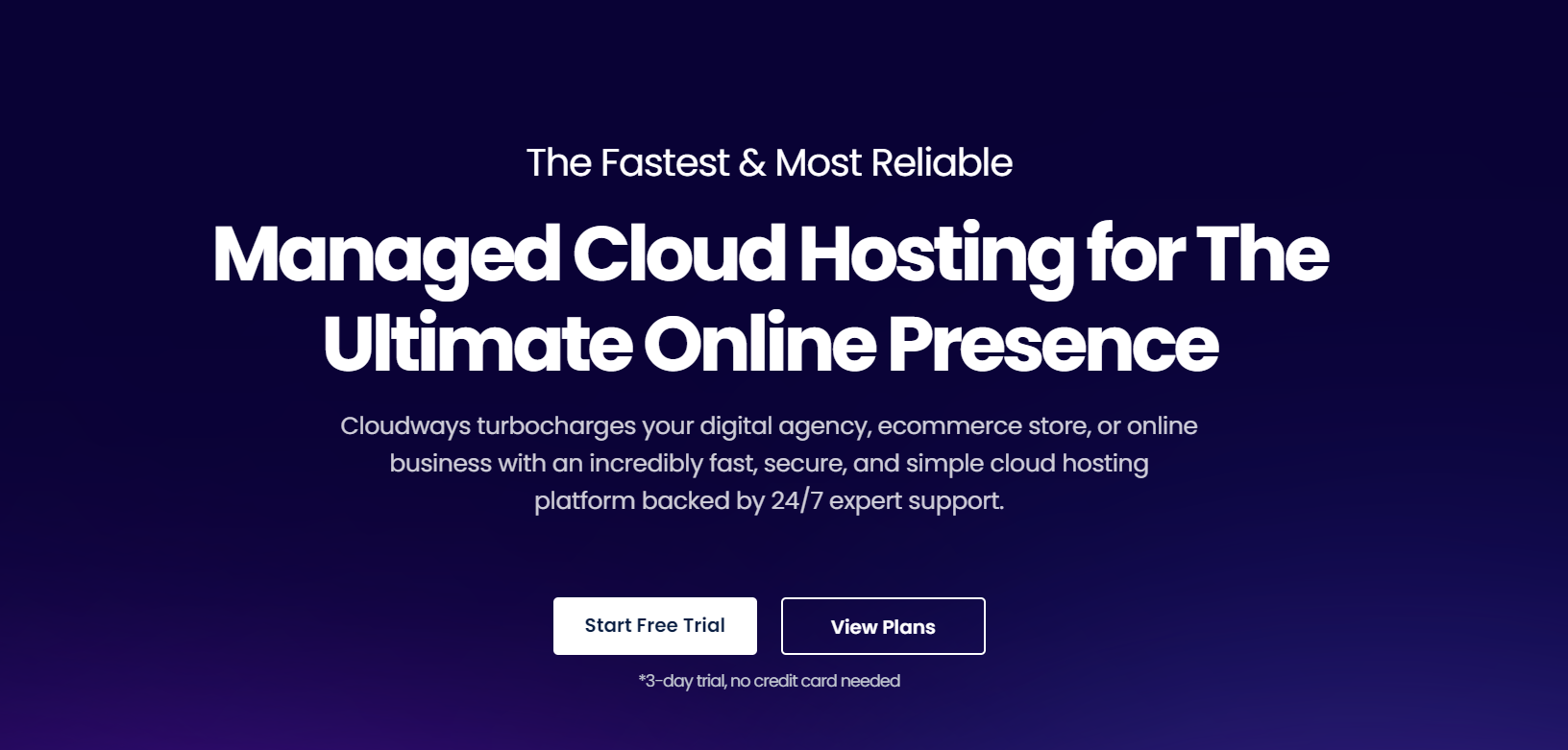
Cloudways stands out with its remarkable uptime performance metrics, boasting 100% in 2020 and 2021, and an impressive 99.99% in 2022. This makes it a reliable choice, especially when compared to competitors like HostGator, GoDaddy, Hostinger, and Bluehost that have relatively lower uptime percentages. Alongside its strong uptime, Cloudways offers a user-friendly control panel and a range of features such as vertical scaling, security measures, and performance optimization.

Pagely excels with its unique high-availability architecture, separate availability zones, and multi-region redundancy, ensuring maximum uptime and reliability. With an average response time of 211ms and a built-in emergency fallback system, Pagely is designed for performance and quick recovery. Although the plans are on the pricier side, the level of support and technical account management provided justifies the cost for those who prioritize these aspects.
Which one has better hosting performance?
Score Components:
- Hosting speed (30%): This includes SSD quality, Load times, PageSpeed score ranges,
additional information on website speed, built-in plugins for performance enhancement, available caching
methods, and CPU/RAM options - CDN (20%): Considers whether CDN is available or not, whether it’s free or paid, and
the quality of the CDN service - Available data centers (30%): Evaluates the number of data centers and their locations
globally. - Scalibility (20%): Looks at whether elastic scaling is available, the process required
to scale (manual upgrade vs. automatic scaling), the presence of dedicated servers, and the costs
associated with scaling.
 8.8
8.8
 8.8
8.8
Winner: Cloudways: Feature-rich hosting optimized for high performance.
When comparing Cloudways and Pagely in terms of general performance, Cloudways offers a suite of speed-enhancing features such as SSD hosting, built-in advanced caches, and an optimized hosting stack with NGINX, Apache, MySQL/MariaDB, and PHP-FPM, making it a strong contender in terms of speed and reliability. Cloudways includes Cloudflare Enterprise for CDN, ensuring global reach and DDoS protection. Pagely, on the other hand, also uses SSDs and offers superior caching with CDN technology, but at considerably higher price points, starting at $375/month for its lite plan. Both companies provide flexible configurations and managed DevOps support, but Cloudways edges slightly ahead with a broader array of performance-enhancing tools included in lower tiers.
Website speed
Cloudways excels in website speed with its SSD drives, which are three times faster than traditional HDDs, and various built-in caches like Memcached, Varnish, Nginx, and Redis. The optimized stack, combined with PHP 8.2 ready servers and the Breeze WordPress cache plugin, ensures lightning-fast load times. Pagely also promises great speed, backed by its decoupled database resources and advanced caching techniques, but it comes at a steeper price and targets more enterprise-level customers.
Scalability
Cloudways offers vertical scaling allowing users to easily scale up server resources like RAM, CPU, and storage at low costs, and supports scaling with 1-click actions. Pagely provides custom scalability options, particularly for its higher-tier plans, but requires discussing with sales for high availability configurations at considerably higher costs. While both platforms support dedicated servers and elastic scaling, Cloudways makes the process simpler and more cost-effective.
Which one has better security features?
and regulatory requirements
Score Components:
- Technical security measures (40%): This includes encryption, firewalls, DDoS
protection, secure configurations, server monitoring, access control and availability of security addons
(e.g Sitelock security). - Operational security measures (30%): Encompasses data privacy, backups and data
redundancy. - Compliance and certifications (20%): Adherence to legal and regulatory requirements
(e.g., GDPR, HIPAA) and possession of certifications (e.g., ISO 27001, SOC 2). - Business and reliability (10%): Factors in the provider’s reputation, uptime
guarantees, and customer support.
 8.0
8.0
 9.2
9.2
🏆 Winner
Pagely: Provides a robust array of security features and exemplary security compliance.
Technical security measures:
Cloudways offers a wide range of security features, including free SSL certificates via Let’s Encrypt, support for PHP 8, server-level firewalls, and automated protection like Fail2ban. Pagely, on the other hand, also supports SSL certificates through Let’s Encrypt and custom options, but extends support with long-term PHP solutions via its Zend add-on. Cloudways employs a platform-level firewall and bot protection, while Pagely leverages a proprietary web application firewall and AWS Shield Standard for DDoS protection. Both offer strong measures, but Pagely’s customized and comprehensive solutions edge it slightly ahead.
Operational security measures:
Cloudways includes automated protection measures like Fail2ban and Patchstack collaboration for real-time vulnerability scanning. It also implements application isolation for WooCommerce stores and built-in advanced caches to enhance security and performance. Pagely offers a similar set of operational protections, including real-time malware scanning, anti-spam filtering, and customizable two-factor authentication. Pagely’s anti-spam filtering and extensive brute-force protection measures show a slightly deeper dedication to tackling everyday operational security concerns, giving it an advantage.
Compliance and certifications:
Cloudways leverages PCI-DSS compliant hardware from its cloud providers like Google and Amazon, though compliance also depends on the user’s own security implementations. Pagely, distinguished by its SOC 2 compliance for rigorous data security standards, also meets GDPR requirements by hosting data in European jurisdictions and has PCI-DSS SAQ-A for e-commerce regulatory needs. The higher level of compliance and adherence to SOC 2 standards positions Pagely as a more reliable option for regulatory adherence.
 |
 |
|
|---|---|---|
SSL certificate |
Free Let’s Encrypt SSL |
Let’s Encrypt and Custom SSL |
Additional security features |
Bot protection, DDoS mitigation |
Anti-spam filtering, Malware scanning |
PHP versions |
PHP 5.6 to PHP 8.2 |
PHP 7.4 or newer with Zend add-on |
GDPR compliance |
Implied |
Yes |
HIPAA compliance |
Not specified |
Not specified |
PCI compliance |
Leveraging PCI-DSS compliant hardware |
Yes |
Hosting features
Score Components:
- Domains (20%): Assesses the availability of a free domain, domain purchase options, and
pricing - Email (15%): Considers if the provider offers full email hosting, or is reselling
third-party service, and if the email is only transactional or not - Website builder (15%): Checks if website builder is available, and it’s user
friendliness and overall the level of customization allowed. - Staging environment (20%): Determines if a staging environment is available, allowing
for testing changes before going live. - FTP & SFTP accounts (10%): Evaluates if and how easily users can access FTP and
SFTP accounts - Git and SSH access (20%): Assess whether Git is integrated into the hosting service and
if SSH access is provided
 6.9
6.9
 4.6
4.6
🏆 Winner: Cloudways: Offers robust performance, security, and user-friendly features.
Cloudways and Pagely both cater to different hosting needs with distinct approaches. Cloudways stands out with its emphasis on performance and ease of use, boasting SSD hosting, built-in caches, and an optimized stack ready for PHP 8. It also shines in security, offering dedicated firewalls, SSL certificates, and robust login security features. Cloudways provides a high level of scalability with pay-as-you-go plans and vertical scaling options. For those who value user-friendliness, Cloudways offers 1-click actions for backup/restore and team collaboration features, making it highly accessible for both beginners and advanced users. Unique selling points like free migration and real-time server monitoring further enhance its appeal.
Pagely leverages the power of AWS, promising high availability and reliability. Designed for those needing superior performance and uptime, its Performance Lite plan starts at a much higher price point. Pagely also provides advanced networking and security, with its PressARMOR™ and PressCACHE™ technologies. For developers, Pagely is a dream with developer-friendly tools like SSH, GIT, and WP-CLI included in all plans. Its managed WordPress upgrades ensure that your site remains secure and up-to-date. Despite its higher costs, Pagely offers customizable hosting solutions to meet specific needs, emphasizing a hands-on support system and daily backups for additional peace of mind.
 |
 |
|
|---|---|---|
Free domain |
No |
No |
Free SSL |
Yes |
Yes |
Email hosting |
Rackspace & Elastic Email |
No |
Website builder |
No |
No |
Staging environment |
Yes |
Yes |
FTP & SFTP accounts |
Yes |
Yes |
Git and SSH access |
Yes |
Yes |
Free backup |
Yes |
Yes |
Money back guarantee |
No |
No |
a location.
As a result in rare cases the features mentioned here can differ from the ones you see on their websites.
Both providers support a range of users from beginners to experts with user-friendly website builders and WordPress staging areas. However, in terms of developer tools, both Cloudways and Pagely offer robust options including SSH access, support for multiple programming languages, and Git for version control, thus appealing to developers looking for advanced capabilities.
Email services:
Email services at Cloudways integrate with Rackspace and Elastic Email for email hosting, allowing for robust transactional email capabilities and user campaigns. In contrast, Pagely does not offer native email hosting but focuses on transactional email functions through third-party providers to support actions like form submissions. This makes Cloudways more versatile for users needing comprehensive email solutions, while Pagely is tailored towards performance and security without email hosting.
Price
Score Components:
- Plan value (40%): What each pricing tier offers.
- Transparency and clarity (30%): Clearness of pricing structures.
- Flexibility of plans (20%): Range of options to suit different budgets.
- Hidden costs (10%): Additional expenses not included in the plan.
 8.6
8.6
 7.4
7.4
🏆 Winner Cloudways:Affordable and versatile hosting solutions with high performance.
Evaluating the pricing of plans among various hosting providers can be complex due to their differing pricing and renewal strategies. Additionally, certain plans require annual commitments, which adds to the difficulty of making comparisons. The prices listed are based on monthly commitments; plans requiring annual commitments are indicated. Additionally, although some providers offer identical plans for WordPress and shared hosting, we have created separate tables for each to enhance clarity.
Cloudways offers various plans across multiple hosting types, providing budget-friendly options. Their WordPress and Ecommerce hosting starts at $11/month and scales based on resources. Pagely, on the other hand, offers managed WordPress hosting starting from $199/month, focusing on robust enterprise features like managed DevOps and dedicated databases. Both providers cater to different needs, with Cloudways suitable for cost-efficient scaling and Pagely for high-level enterprise-specific requirements.
 |
 |
|---|---|
|
DO1GB$11
1 GB RAM, 1 Core, 25 GB Storage, 1 TB Bandwidth, Standard Support, SSL Included Value for price:9.0
|
Developer 1$199
2 vCPU (Burstable), 2 GB RAM, 30 GB SSD Storage, PHP Workers, DevOps, SSL Included Value for price:6.0
|
|
DO2GB$24
2 GB RAM, 1 Core, 50 GB Storage, 2 TB Bandwidth, Standard Support, SSL Included Value for price:8.5
|
Developer 2$299
2 vCPU (Burstable), 4 GB RAM, 30 GB SSD Storage, PHP Workers, DevOps, SSL Included Value for price:6.5
|
|
DO4GB$46
4 GB RAM, 2 Core, 80 GB Storage, 4 TB Bandwidth, Standard Support, SSL Included Value for price:8.0
|
Performance Lite$375
2 vCPU, 4 GB RAM, 50 GB SSD Storage, PHP Workers, Decoupled DB, SSL, Support Value for price:7.0
|
|
DO8GB$88
8 GB RAM, 4 Core, 160 GB Storage, 5 TB Bandwidth, Standard Support, SSL Included Value for price:7.5
|
Performance$499
2 vCPU, 4 GB RAM, 50 GB SSD Storage, PHP Workers, Decoupled DB, SSL, Support Value for price:7.1
|
|
DO16GB$149
16 GB RAM, 8 Core, 320 GB Storage, 6 TB Bandwidth, Standard Support, SSL Included Value for price:7.2
|
Performance+$999
4 vCPU, 8 GB RAM, 50 GB SSD Storage, PHP Workers, Decoupled DB, SSL, Support Value for price:7.5
|
 |
 |
|---|---|
|
DO1GB$11
1 GB RAM, 1 Core, 25 GB Storage, 1 TB Bandwidth, Standard Support, SSL Included Value for price:9.0
|
Developer 1$199
2 vCPU (Burstable), 2 GB RAM, 30 GB SSD Storage, PHP Workers, DevOps, SSL Included Value for price:6.0
|
|
DO2GB$24
2 GB RAM, 1 Core, 50 GB Storage, 2 TB Bandwidth, Standard Support, SSL Included Value for price:8.5
|
Developer 2$299
2 vCPU (Burstable), 4 GB RAM, 30 GB SSD Storage, PHP Workers, DevOps, SSL Included Value for price:6.5
|
|
DO4GB$46
4 GB RAM, 2 Core, 80 GB Storage, 4 TB Bandwidth, Standard Support, SSL Included Value for price:8.0
|
Performance Lite$375
2 vCPU, 4 GB RAM, 50 GB SSD Storage, PHP Workers, Decoupled DB, SSL, Support Value for price:7.0
|
|
DO8GB$88
8 GB RAM, 4 Core, 160 GB Storage, 5 TB Bandwidth, Standard Support, SSL Included Value for price:7.5
|
Performance$499
2 vCPU, 4 GB RAM, 50 GB SSD Storage, PHP Workers, Decoupled DB, SSL, Support Value for price:7.1
|
|
DO16GB$149
16 GB RAM, 8 Core, 320 GB Storage, 6 TB Bandwidth, Standard Support, SSL Included Value for price:7.2
|
Performance+$999
4 vCPU, 8 GB RAM, 50 GB SSD Storage, PHP Workers, Decoupled DB, SSL, Support Value for price:7.5
|
 |
 |
|---|---|
|
AWS Small$38.56
2 GB RAM, 2 Core, 20 GB Storage, 2 GB Bandwidth, Standard Support, SSL Included Value for price:8.0
|
Enterprise Class$2500
Multi-region redundancy, SLA, Technical Account Management, Bespoke Deployments, Compliance Ready Value for price:7.0
|
|
GCE Small$37.45
1.75 GB RAM, 1 Core, 20 GB Storage, 2 GB Bandwidth, Standard Support, SSL Included Value for price:7.8
|
Business Class$499
CI/CD, Shell Access, Dev Tools, Standard SLA, Amazing Support Value for price:7.6
|
|
Vultr1GB$14
1 GB RAM, 1 Core, 25 GB Storage, 1 TB Bandwidth, SSL Included Value for price:9.3
|
Developer 1$199
2 vCPU (Burstable), 2 GB RAM, 30 GB SSD, PHP Workers, SSL, Support Value for price:6.0
|
|
Lin1GB$14
1 GB RAM, 1 Core, 25 GB Storage, 1 TB Bandwidth, SSL Included Value for price:9.3
|
Developer 2$299
2 vCPU (Burstable), 4 GB RAM, 30 GB SSD, PHP Workers, SSL, Support Value for price:6.5
|
|
N/A
|
Scale$2500
Custom CPU and RAM, Custom SSD Storage, PHP Workers, Dedicated DB, Support, SSL Value for price:7.8
|
Enterprise plans
For enterprises, Cloudways provides scalable options with higher RAM, CPU, and bandwidth at competitive prices. Plans can be tailored to eCommerce and cloud needs. Pagely focuses on high-end enterprise features like multi-region redundancy, dedicated technical account management, and compliance readiness, starting at $2500/month. Each provider emphasizes different aspects of scalability and support, catering to distinct enterprise requirements.
Cloudways vs Pagely: Ease of setup
platform.
Score Components:
- Site migration (25%): Assesses whether the provider offers tools for site migration,
either automated or manual, and whether these services are free or require a fee. - Admin panel usability (35%): Evaluates the type of admin panel provided, such as the
standard cPanel or a custom solution, focusing on its accessibility and user-friendliness for both
technical and non-technical users. - Setup features (20%): Examines the availability and ease of use of various setup
features, including FTP accounts, file managers, email account setup, PHPMyAdmin, and easy CDN
configuration. - Help center quality (20%): Measures the quality and accessibility of the provider’s
help center resources, including articles and tutorials.
 9.0
9.0
 8.2
8.2
🏆 Winner: Cloudways: Streamlined setup with numerous automated 1-click operational tasks. Cloudways features an intuitive control panel tailored for both technical and non-technical users. With its clear design and user-friendly interface, managing your server and applications becomes a straightforward task. The platform simplifies complex actions with 1-click options, such as launching popular applications and managing backups. Meanwhile, Pagely employs a custom admin panel designed for seamless WordPress management. While it’s accessible, it may require a bit of a learning curve for those not familiar with WordPress nuances. The focus is more on providing granular control, making it suited for users comfortable with WordPress specifics.
Both hosting providers prioritize ease of use in their admin panels, but in unique ways. Cloudways leans toward an all-encompassing, no-fuss approach, offering a variety of pre-installed tools and 1-click actions. SSH and SFTP access further ease the management of files. On the other hand, Pagely’s panel provides specialized features that may cater more to WordPress enthusiasts, particularly with its caching and database tools.
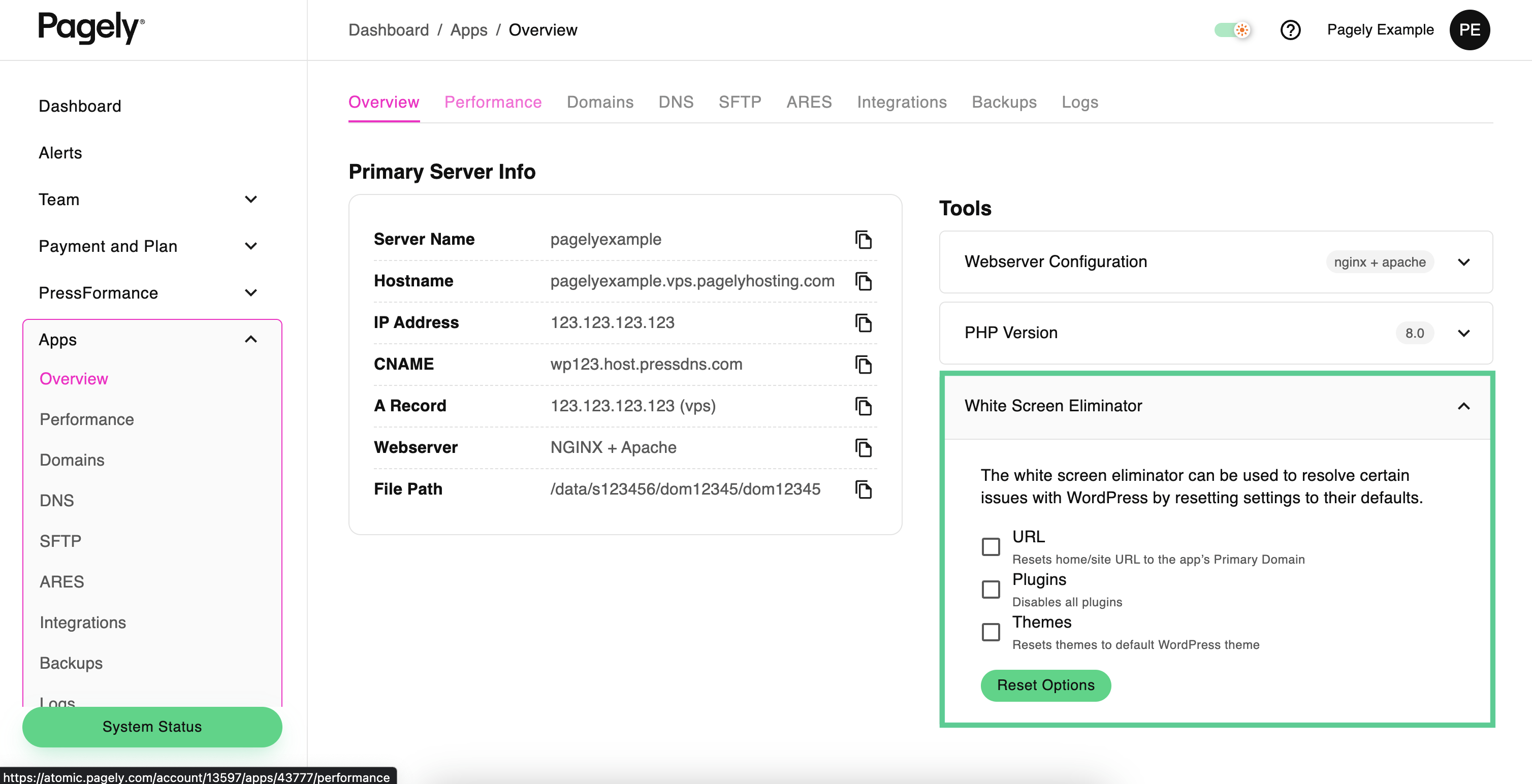
Cloudways offers a free migration service for the first website from any host, making the switch hassle-free. The migration is streamlined, utilizing automated tools to ensure consistency and reliability. Pagely also provides migration assistance but predominantly through manual methods that may require additional fees. This approach offers more customization but involves more user effort during the migration process.
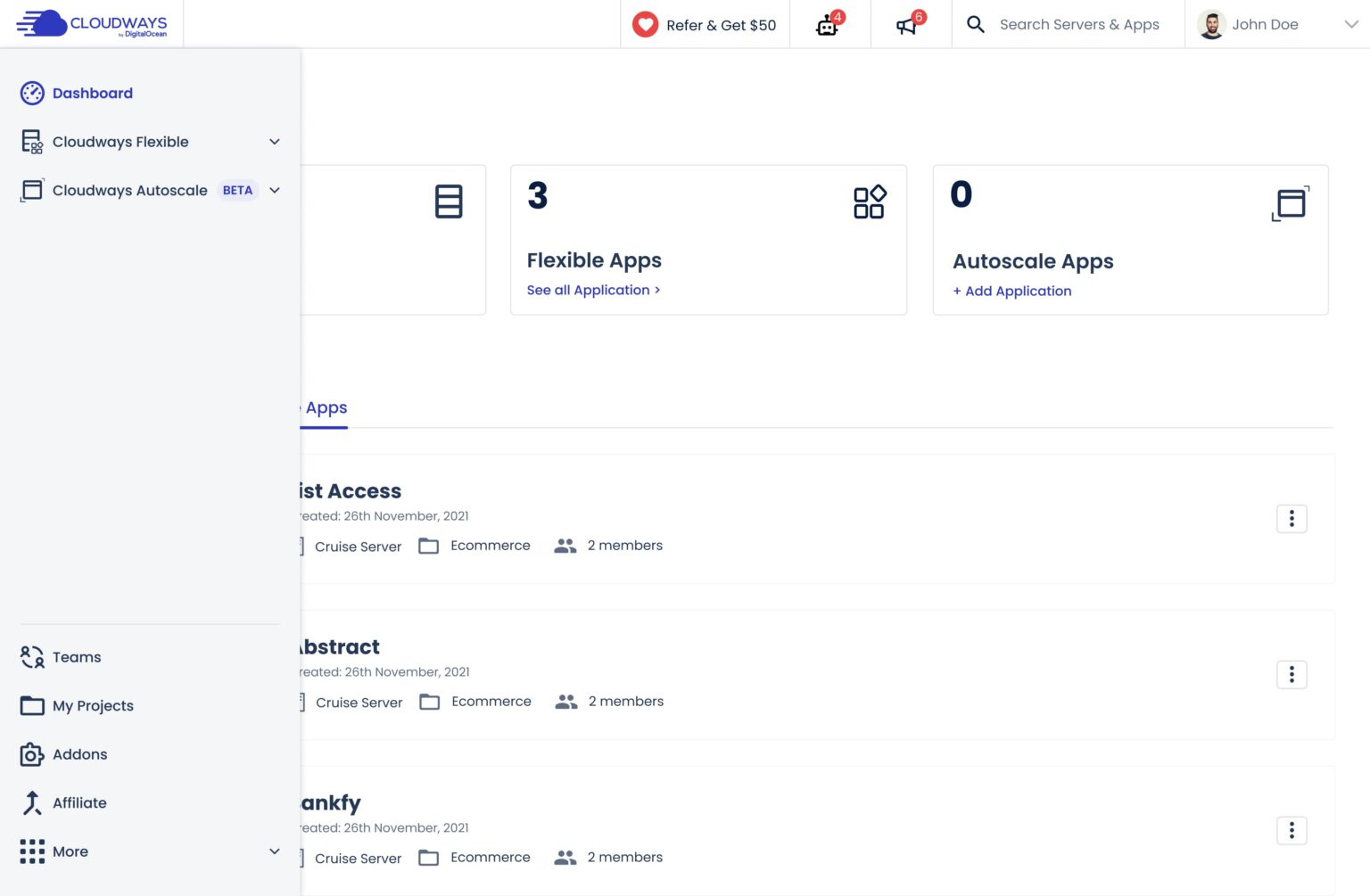
Both providers maintain extensive help center resources. Cloudways’ Help Center features articles, guides, a ticketing system, and 24/7 live chat, which helps cover immediate and complex needs. Pagely similarly offers a comprehensive support section, including detailed tutorials and onboarding guides. Though expansive, it might feel more tailored to WordPress-specific issues. Active communities and extensive documentation bolster the support from both hosts, making expert advice readily accessible.
The platforms provide extensive knowledge bases filled with guides, how-to articles, and instructional content. Cloudways offers a wide range of resources alongside 24/7 chat and phone support. Pagely also boasts a detailed help center with an intuitive search function and around-the-clock support via live chat, phone, and ticketing, ensuring comprehensive user support.
User management
accessibility.
Score Components:
- Role customization (40%): Flexibility in creating and defining user roles and
permissions. - Ease of management (30%): User interface and tools for managing users.
- Access control (20%): Effectiveness of access control measures for different user
levels. - Scalability (10%): Ability to manage a growing number of users efficiently.
 8.2
8.2
 8.4
8.4
🏆 Winner Pagely: User management capabilities optimized for various administrative needs.
Both Cloudways and Pagely offer a solid approach to managing user roles and permissions, but they cater to different needs. Cloudways integrates with the WordPress Admin Panel, allowing users to manage roles like Super Admin, Administrator, Editor, and more. This makes it easier for those already familiar with WordPress to assign specific tasks and roles. However, Pagely provides a more extensive array of pre-defined user roles such as Account Owner, Super-Admin, Sub-Admin, Tech, Billing, App-Only, and App-Only-Minimal. Pagely’s roles are highly detailed, giving administrators fine-grained control over who can do what, from managing billing to accessing backups.
Cloudways offers a straightforward interface through the WordPress Admin Panel for user management, accessible via direct URL or the Cloudways Platform. Its familiar look to WordPress users ensures anyone with experience can navigate it with ease. Pagely, on the other hand, provides a more granular management interface that may seem intricate but allows for detailed role assignments. This interface includes advanced tools like SSH/SFTP key management, which are beneficial for more technically inclined users.
In terms of access control measures and scalability, both platforms are effective but operate differently. Cloudways primarily leverages WordPress’s built-in user roles and capabilities, making it easier to scale for those hosting multiple WordPress sites. Pagely’s detailed roles and permissions enable a more sophisticated access control method, suitable for larger teams and more complex environments. Pagely’s capabilities in forcing 2-factor authentication and managing account-specific settings provide a higher level of security and scalability.
Cloudways User Roles Table:
| Role | Description | Access Highlights |
|---|---|---|
| Super Admin | Full access to manage the entire website, including network-wide features. | Can install/uninstall plugins, themes, and manage all site settings. |
| Administrator | Complete control over administrative functions of the website. | Manage plugins, themes, and all site settings. Can add/edit/delete users. |
| Editor | Can create, edit, and publish all posts including those by other users. | Limited to content management. |
| Author | Limited to creating, editing, and publishing their own posts. | Cannot manage other users or site settings. |
| Contributor | Can create and edit their own posts but cannot publish them. | Must submit posts for review. |
| Subscriber | Restricted to managing their profiles. | Cannot edit or create posts. |
Pagely User Roles Table:
| Role | Description | Access Highlights |
|---|---|---|
| Account Owner | Top-level role with full permissions to manage account and user roles. | Manage all aspects including billing, sites, and 2FA settings. |
| Super-Admin | High-level administrative duties. | Similar to Account Owner but cannot force 2FA. |
| Sub-Admin | Mid-level admin with control over site-specific settings and user roles. | Can manage sites, users, and access backups. |
| Tech | Focused on technical management responsibilities. | Can manage sites, access backups, and SFTP into sites. |
| Billing | Primarily concerned with managing billing-related tasks. | Can manage 2FA, access backups, and key management. |
| App-Only | Limited to application-level management without broader administrative powers. | Can manage SFTP keys and access backups. |
| App-Only-Minimal | Even more restricted to basic app-level management tasks. | Limited to managing SFTP keys and accessing backups. |
Customer support
hosting provider.
Score Components:
- Support communication channels (30%): Measures the variety of customer support types
provided (live chat, chatbot, email, phone, etc.) - Availability (20%): Assesses the availability hours for each channel, including 24/7
support options. - Technical support quality (30%): Assesses whether the provider offers comprehensive
technical support, including hardware upgrades (e.g., HDD to SSD), software installations, and web
server configuration changes. - Enterprise support (20%): Checks if there are dedicated or priority support services
for enterprise-level customers.
 9.2
9.2
 8.9
8.9
🏆 Winner Cloudways: Offers 24/7 customer service through email, live chat, phone support via request, and private Slack channels for premium support.
 |
 |
|
|---|---|---|
| Phone support | ||
| Live chat support | ||
| Chatbot | ||
| Email/ticket support | ||
| Enterprise support (dedicated agent, priority support) |
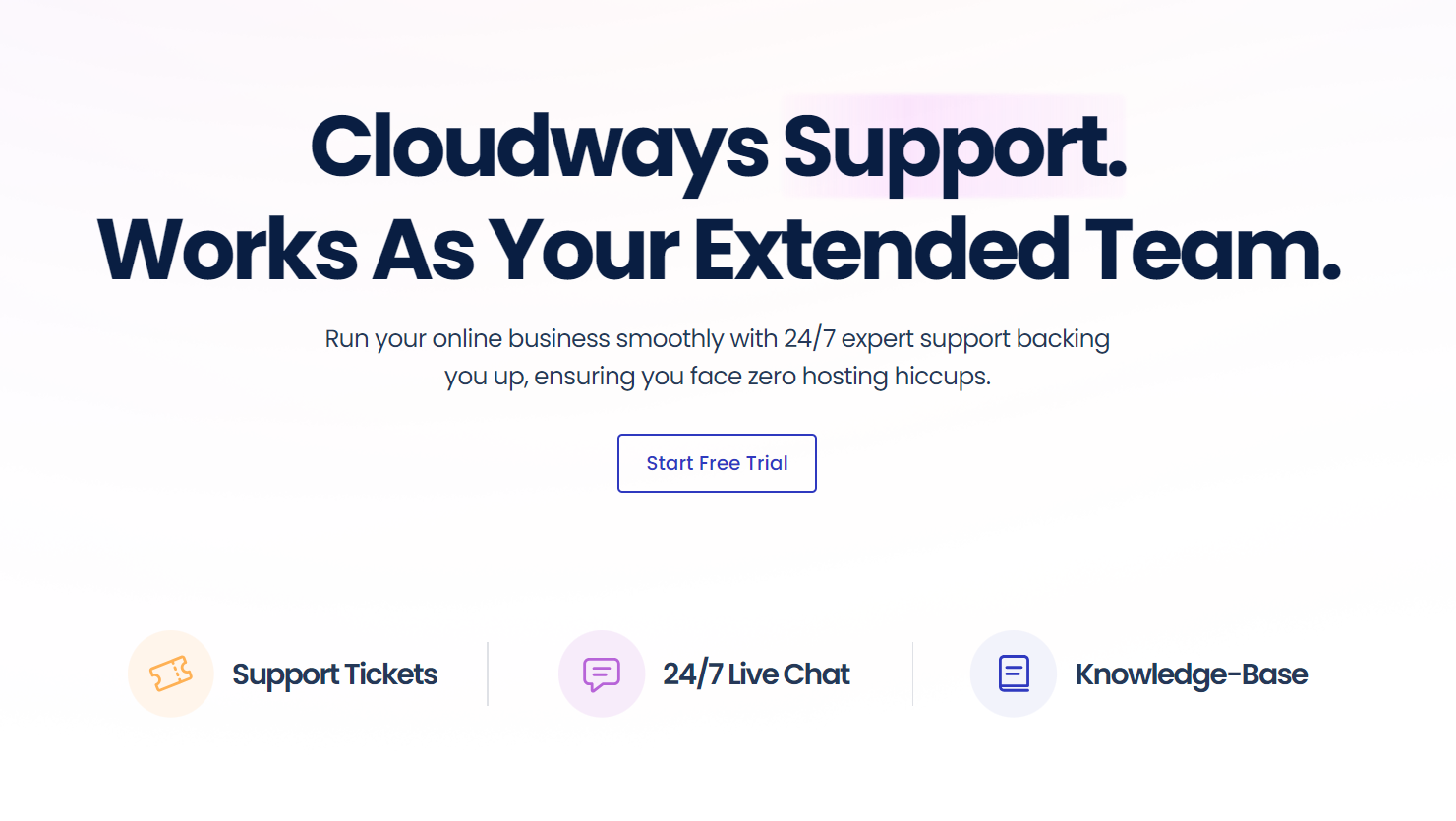
Cloudways and Pagely both provide exceptional customer service around the clock. Cloudways offers 24/7 email and live chat support, as well as phone support available upon request, and a dedicated Slack channel with premium add-ons. They also feature proactive monitoring and customization support for advanced and premium users. Pagely, meanwhile, delivers 24/7 support via tickets and live chat, with phone support for select plans. Their team consists of skilled engineers who resolve issues without need for escalation, and they offer Slack support for enterprise customers.
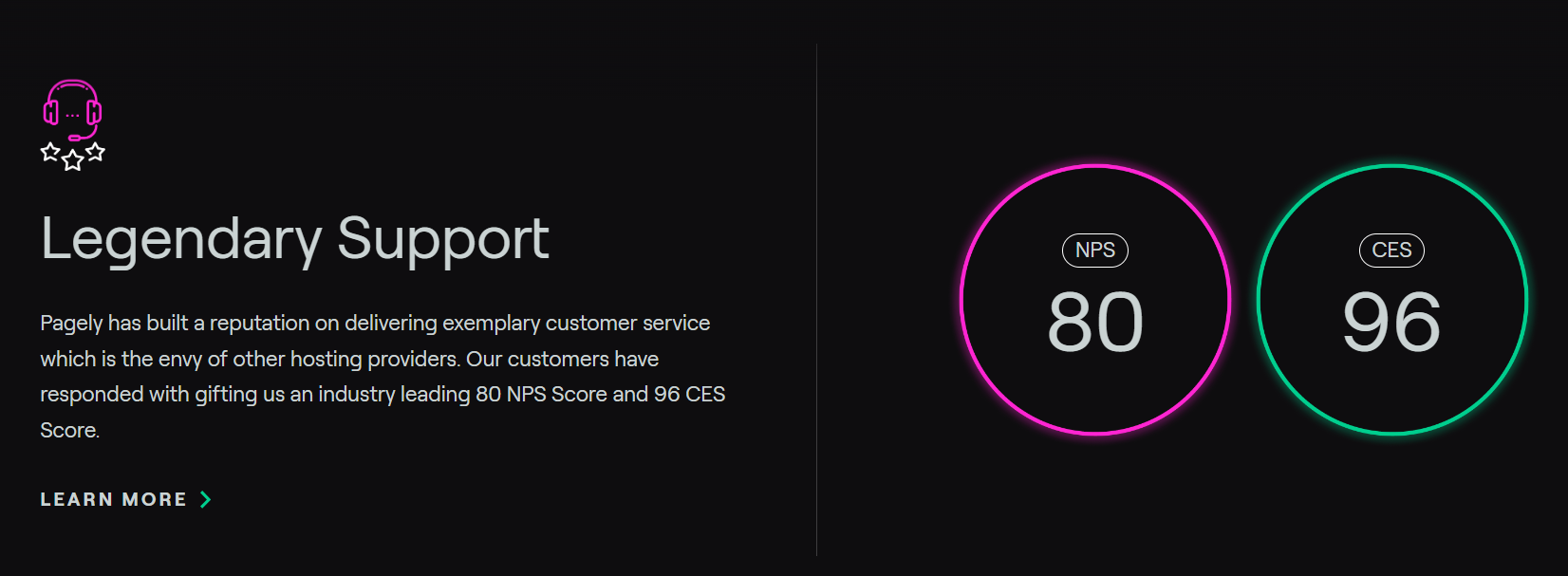
Overall, Cloudways stands out with its variety of support channels and premium options that include faster response times and a dedicated account manager. Pagely’s highlights include their tierless support system and high customer satisfaction. While both providers excel in customer service, Cloudways edges out with its comprehensive support suite tailored to varying needs.
Cloudways vs Pagely: User feedback
User feedback for this hosting provider is predominantly positive, highlighting easy-to-use interface and robust customer support as key strengths. Users appreciate the intuitive platform, simplified server management, and various performance-boosting features, making it ideal for both personal and client projects. However, some users noted challenges for those with limited technical knowledge and expressed concerns about pricing, lack of email hosting, and occasional user interface issues. Overall, the strong support and fast, reliable performance make it a favored choice despite minor drawbacks.
Users highly appreciate this hosting provider for its exceptional reliability and top-notch customer support, often comparing it to having an on-call DevOps team. The platform is praised for its speed, security, and a suite of features designed specifically for WordPress hosting. Many find the management tools intuitive and effective, though some express a desire for improvements in specific areas like the Atomic dashboard and multi-user access. The main criticism revolves around the high cost, which is noted as a barrier for smaller operations, but many users agree the premium price is justified by the service’s quality and reliability.
Cloudways vs Pagely: FAQ
Which platform is better suited for hosting WordPress websites?
Both Cloudways and Pagely provide strong capabilities for WordPress hosting, including managed updates, security features, and support. The choice largely depends on specific requirements; Cloudways is more budget-friendly and versatile, while Pagely offers a premium experience with superior performance and security.
Which hosting service offers more scalability options for growing websites?
Cloudways offers vertical scaling and 1-click actions to scale up server resources for growing websites. Pagely also provides custom scalability options, especially for higher-tier plans with a focus on high availability, though these come at higher costs and require discussions with sales.
What are the major differences in pricing and value between cloudways and pagely?
Cloudways offers more budget-friendly plans starting at $11/month, making it suitable for cost-efficient scaling. Pagely’s pricing starts at $199/month and includes enterprise-level features like managed DevOps and dedicated databases, focusing on high-end performance and compliance.
Which platform offers better customer support?
Both Cloudways and Pagely provide 24/7 customer support via email, live chat, and phone. Cloudways also offers private Slack channels for premium support, while Pagely is noted for its skilled engineering team resolving issues without escalation. Cloudways’ variety of support channels slightly edges it ahead.
How do the providers handle email hosting and what features are included?
Cloudways integrates with Rackspace and Elastic Email for robust transactional email capabilities and user campaigns. Pagely does not offer native email hosting but supports transactional emails through third-party providers, favoring performance and security without a comprehensive email solution.
The making of this blog
We followed a clear, step-by-step process to write and research this article.









